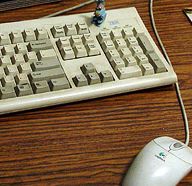 More environmentally friendly computer equipment will soon be available to large volume purchasers thanks to manufacturers like Dell, HP, and others that now have products containing reduced levels of cadmium, lead, and mercury to better protect human health, that are easier to upgrade and recycle, and meet the government’s Energy Star guidelines for energy efficiency…
More environmentally friendly computer equipment will soon be available to large volume purchasers thanks to manufacturers like Dell, HP, and others that now have products containing reduced levels of cadmium, lead, and mercury to better protect human health, that are easier to upgrade and recycle, and meet the government’s Energy Star guidelines for energy efficiency…
All the new greener products meet the test of the Electronic Products Environmental Assessment Tool (EPEAT), a standard for computer products that measures environmental factors.
“These new standards can guide the manufacturing of green computers, laptops, and monitors,” said James Gulliford, assistant administrator for the Office of Prevention, Pesticides and Toxic Substances. “Now purchasers can factor environmental considerations into their decisions when choosing computer equipment.”
EPEAT, a project funded through a grant by the U.S. Environmental Protection Agency and managed by the Green Electronics Council (GEC), promotes continuous improvement in the environmental design of electronic products and informs purchasers of the environmental criteria of electronic products. EPEAT may eventually expand to include individual consumer purchasers.
EPA has estimated that over the next five years, purchases of EPEAT registered computers will result in reductions of:
- More than 13 million pounds of hazardous waste
- More than 3 million pounds of non-hazardous waste
- More than 600,000 MWh of energy — enough to power 6 million homes
For more information about the EPEAT standard, the database of EPEAT registered products and the participating manufacturers, visit their Web site.



















